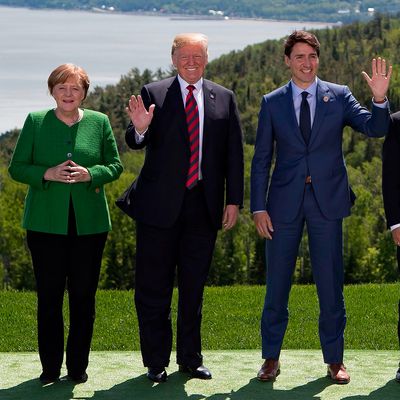
“When I was commander of US Southern Command in Miami, we often held events at Doral because it was cheap, often empty and not owned by our boss,” tweeted Retired Admiral James Stavridis, a former Supreme Allied Commander of NATO.
Despite that endorsement of sorts, President Trump no longer intends to host next year’s G7 summit at the Trump Doral golf resort in Florida. That doesn’t mean he’s happy about the decision. He used the occasion of a Cabinet meeting Monday to insist a meeting at Trump Doral would have been the best G7 ever, held at cost or even cheaper, if that was possible.
But what does “at cost” mean, anyway?
A resort has variable costs: The more guests are staying on a given day, the more little soaps must be replaced and the more labor hours are accrued by maids and receptionists. The electrical bill is going to be higher when the hotel is full than when it is empty. When guests stay for a conference, there are costs for catering and audio-visual equipment rental and sundry other things that wouldn’t be incurred if the meeting rooms sat empty.
But a resort also has major fixed costs. There is the initial cost to buy land and build the buildings, which must be amortized over time. There is mortgage interest to pay, property taxes, and insurance. Even when workers’ hours can be adjusted up and down with the level of business, some labor costs (like benefits) may be fixed so long as the hotel keeps its workers on the payroll. And there are certain staff (like managers and maintenance workers) who have to be kept around all the time, whether the property is full or empty.
To make a profit running a hotel, you should never rent a room for less than the variable cost to service the guest in the room. And you should rent the rooms at an average rate across the year so that you have covered all your fixed costs, in addition to the variable costs.
So then, what does “cost” mean? Does it just mean the variable cost, or does it also include an allocation of the fixed costs?
When a hotel or resort participates in a major chain like Marriott or Hilton, this question comes up frequently when accounting for award stays booked with loyalty-program points. When you book a stay on points, the chain that awarded you the points will reimburse the hotel owner who is actually hosting you for the “cost” of your stay, but “cost” is defined differently depending on the context. In general, if the hotel is full, the chain will pay close to the hotel’s average daily cash rate, since the cost to the hotel is the foregone revenue it would have gotten from a cash-paying customer if you hadn’t taken the room. But if the hotel is not full, the chain assumes the room would have otherwise sat empty if you hadn’t booked it, and so the hotel owner gets a much smaller payment to compensate only for the added cost of servicing an occupied room.
Usually, this billing process is invisible to the guest, but on a recent trip to East Africa, points blogger Ben Schlappig found the reimbursement rates for his award stays were disclosed on his bill. The payments were not large: Marriott paid the Four Points by Sheraton Nairobi Airport $36 for a one-night award stay, while the Marriott Kigali got $52.
June is, to put it mildly, not high season in Miami. I can say categorically that nothing that happens in South Florida in June is the best anything ever, except maybe the best way to become soaked in sweat just by standing outside. This is likely why Stavridis found the Trump Doral was such a cost-effective place to have conferences: If you work in Doral (where Southern Command is based) you may have reason to use conference facilities there in the summer, even if that would be a miserable time for a golf vacation.
So if we were being honest about the true economic “cost” to the Trump organization to hold the G7 at Doral in June, we should be looking at payments similar to the ones Marriott would make to a hotel where a customer makes an award booking during low season, when the hotel has many empty rooms. That is to say: very low payments.
In practice, this does not appear to be how Trump thinks about charging the government for use of his resort facilities. As Derek Kravitz reported for ProPublica last year, a group of White House staffers had drinks at Mar-a-Lago one evening in April 2017, and American taxpayers bought them 54 drinks at $18.67 per drink. There was also a 20 percent service charge, even though Trump’s aides kicked the bartender out of the room and poured their own drinks. It is hard to imagine that $18.67 covers only the variable cost of serving each drink.
Acting chief of staff Mick Mulvaney says Trump “still considers himself to be in the hospitality business.” Of course, a good hospitality businessman will always try to recoup his fixed costs where he can. And what better opportunity to recoup fixed costs than when you have a captive customer, like a foreign power that’s a G7 member, who has no choice but to stay at your resort?
It was a great plan, except for all the ways in which it was a terrible plan.





























